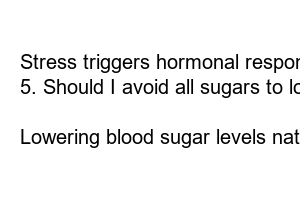혈당 수치 낮추는 법
Title: How to Lower Blood Sugar Levels: Practical Tips for Managing Your Health
Introduction:
Managing blood sugar levels is essential for individuals with diabetes or those at risk of developing the condition. Maintaining optimal blood sugar levels helps prevent complications and ensures overall well-being. In this article, we will explore practical steps you can incorporate into your lifestyle to lower blood sugar levels naturally.
1. Eat a Balanced Diet:
– Incorporate a variety of fruits, vegetables, whole grains, and lean proteins into your meals.
– *Avoid excessive consumption of refined sugars and processed foods.*
2. Portion Control:
– Break your meals into smaller, more frequent portions throughout the day to help regulate blood sugar levels.
– *Remember to eat mindfully, focusing on the quality and quantity of each meal.*
3. Choose the Right Carbohydrates:
– Opt for complex carbohydrates such as whole grains, legumes, and vegetables over refined carbohydrates.
– *These choices release glucose into the bloodstream more slowly, preventing spikes in blood sugar.*
4. Regular Physical Activity:
– Engage in aerobic exercises like walking, swimming, or cycling for at least 30 minutes a day.
– *Physical activity helps your body utilize glucose effectively, promoting lower blood sugar levels.*
5. Adequate Hydration:
– Drinking enough water helps flush out excess sugar from the blood and promotes overall health.
– *Limit sugary beverages and opt for water, herbal teas, or infused water with a splash of citrus for flavor.*
6. Get Sufficient Sleep:
– Lack of sleep can disrupt insulin production, leading to elevated blood sugar levels.
– *Ensure you get 7-9 hours of quality sleep each night to support healthy blood sugar management.*
7. Manage Stress:
– High-stress levels can cause hormonal imbalances that impact blood sugar control.
– *Incorporate stress management techniques like meditation, yoga, or deep breathing exercises into your routine.*
Summary:
Lowering blood sugar levels is crucial for overall health and well-being. By adopting a balanced diet, practicing portion control, making smart carbohydrate choices, engaging in regular physical activity, staying hydrated, getting enough sleep, and managing stress, you can effectively regulate blood sugar levels and reduce the risk of complications associated with diabetes or high blood sugar.
FAQs:
1. Can I lower my blood sugar levels without medication?
Yes, lifestyle modifications such as adopting a healthy diet, regular physical activity, and stress management techniques can help manage blood sugar levels without medication. However, consult your healthcare provider for personalized advice.
2. Are all carbohydrates bad for blood sugar levels?
Not all carbohydrates are created equal. Incorporating complex carbohydrates, such as whole grains and vegetables, can help stabilize blood sugar levels due to their slower digestion and absorption.
3. Can exercise harm my blood sugar levels?
Exercise generally helps regulate blood sugar levels. However, if you’re on medication or insulin, it is essential to monitor your blood sugar levels before, during, and after exercise, as it can cause fluctuations.
4. How can stress impact blood sugar levels?
Stress triggers hormonal responses that can elevate blood sugar levels. Implementing stress management techniques can help regulate blood sugar levels and promote overall well-being.
5. Should I avoid all sugars to lower blood sugar levels?
While it’s important to limit refined sugars found in processed foods, natural sugars present in fruits can be part of a balanced diet. Moderation is key.
6. How long does it take to lower blood sugar levels naturally?
Lowering blood sugar levels naturally depends on various factors, including individual health, age, and lifestyle. Consistently implementing lifestyle modifications can lead to better blood sugar management over time.

